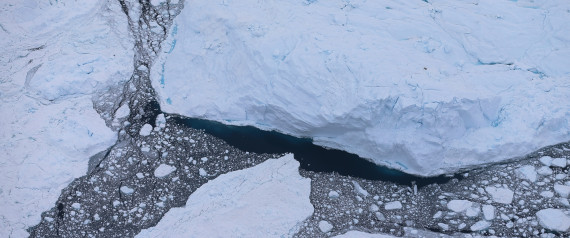 WASHINGTON (AP) — The rapid melting in the Arctic eased up this year. But the government says global warming is still dramatically altering the top of the world, reducing the number of reindeer and shrinking snow and ice, while increasing certain fish and extending the growing season.
WASHINGTON (AP) — The rapid melting in the Arctic eased up this year. But the government says global warming is still dramatically altering the top of the world, reducing the number of reindeer and shrinking snow and ice, while increasing certain fish and extending the growing season.The National Oceanic and Atmospheric Administration issued its report card for the Arctic on Thursday, portraying 2013 as moderate compared with the roasting 2012.
Overall Arctic temperatures didn't soar quite as high, and Greenland ice sheets and summer sea ice didn't melt as much.
"The Arctic caught a break, if you will, in 2013, but one year doesn't change the long-term trend toward a warmer Arctic," said report card editor Martin Jeffries, a University of Alaska geophysicist who is the science adviser to the U.S. Arctic Research Commission.
While 2013 looks a tad cool compared with the last six years, it is unusually warm compared with the 20th century, he said.
The report card was released at the American Geophysical Union scientific conference in San Francisco.
Central Alaska's summer was one of the warmest on record, coming months after its coldest April since 1924, NOAA said. Fairbanks experienced a record 36 days of more than 80 degrees. And snow cover in May and June was near record low levels in North America and broke a record for the least snow in Eurasia.
But one of the biggest climate change indicators, summer sea ice, wasn't as bad as expected. Sea ice reached its sixth-lowest level since NOAA began measuring — up from the lowest ever in 2012. But the seven lowest levels have all occurred in the last seven years.
"This is simply natural variability," said National Snow and Ice Data Center director Mark Serreze, who wasn't part of the NOAA report but praised it. "There is nothing about the year 2013 that provides any evidence that the Arctic is starting a path toward recovery."
He added: "Looking back 20 years from now, the world will be warmer and we'll have much less sea ice than today. We'll see that 2013 was just a temporary respite."
More ominous are long-term trends, NOAA's report card said.
Average Arctic temperatures have increased 3.6 degrees since the 1960s, rising twice as fast as the rest of the world. The growing season has lengthened by nearly a month since 1982.
Fish species are moving north, permafrost is melting, and shrubs are greening in ways that weren't seen before.
University of Virginia environmental scientist Howard Epstein warned that changes in the Arctic reverberate around the globe.
"The Arctic is not like Vegas," he said. "What happens in the Arctic doesn't stay in the Arctic."
Original Article
Source: huffingtonpost.com/
Author: SETH BORENSTEIN
No comments:
Post a Comment